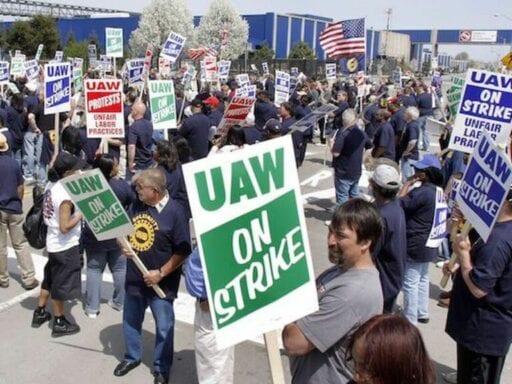Vox Sentences is your daily digest for what’s happening in the world. Sign up for the Vox Sentences newsletter, delivered straight to your inbox Monday through Friday, or view the Vox Sentences archive for past editions.
Union Auto Worker strikes against General Motors continue into Day 2; Israeli voters head to the polls for the second time in five months.
Thousands on the street for better pay
/cdn.vox-cdn.com/uploads/chorus_asset/file/19209559/gm1.180228.jpg) Bill Pugliano/Getty Images
Bill Pugliano/Getty Images- Nearly 50,000 United Auto Workers continued striking against General Motors on Tuesday, bringing 55 manufacturing plants and distribution warehouses to a standstill as the two sides clash over a new four-year contract for the employees. [YouTube / ABC News]
- Better pay is at the top of UAW’s concerns. The union is primarily seeking pay raises for GM’s entry-level workers — who now earn less than $20 an hour — and a better profit sharing plan. The dispute also revolves around two iconic assembly lines that are slated to close. [CNN Business]
- GM had responded ahead of the strike with an offer to invest $7 billion in eight US plants and create more than 5,400 jobs, most of them aimed at new hires. UAW rejected the offer. [Bloomberg and Time / David Welch and Keith Naughton]
- The walkouts crossed the 24-hour mark as GM and the UAW union entered talks over the possible resolution of the latter’s demands. The last strike by UAW in 2007 had little impact on the company, though. [CBS News]
- According to the AP, a union spokesperson said the warring sides have only agreed on 2 percent of the contract as of Monday night. [AP / Tom Krisher and Mike Householder]
- GM is vying for a quick end to the dispute, as stalled production could cost the company between $50 million and $100 million daily. The firm reported $35 billion in earnings in North America over the last three years, despite having laid off some 3,300 employees. [WSJ / Mike Colias]
- Depending on their duration, the strikes could create a massive snowballing effect to suppliers and potentially harm thousands of businesses. GM has a large enough inventory to satisfy consumer needs for another 70 days, though shortages may begin showing up around the US. [NYT / David Yaffe-Bellany]
2 elections in 5 months
- Tuesday’s election marked the second time in five months Netanyahu had to face voters after failing to form a governing coalition. In April, both his right-wing Likud party and the opposing Blue and White party came away with 35 seats each in the 120-seat Knesset, Israel’s parliament. [BBC]
- It’s a tight race this time, too. Exit polls show a deadlock between the two parties, but this may not reflect the final results. Both parties initially declared victory in the last election based on varying exit polls. [CNN]
- Netanyahu’s campaign has been bogged down by multiple corruption cases involving fraud, bribery and breach of trust, threatening his tenure as the longest-running Israeli prime minister. It’s widely believed he called for an election in part to be able to pass a law granting him immunity for crimes he committed in office if reelected. [NPR / Scott Neuman]
- But Netanyahu fought till the last gasp. He took to Twitter to urge voters against supporting a “left-wing government with Arab parties” on Tuesday, as candidates were prohibited from appearing on mainstream media, while last week he announced a plan to annex the Jordan Valley in the occupied West Bank to attract more right-wing supporters. [Reuters / Dan Williams]
- The Israeli-Palestinian conflict remains the key issue in regional elections, and likely affected the outcome on Tuesday, too. Israeli politics are highly tribal, so here’s a guide for voters’ allegiances based on ethnic groups, religious factions and ideologies. [NYT / David M. Halbfinger and Sergey Ponomarev]
Miscellaneous
- Cornell University’s medical school announced it will give loan-free full scholarships to all students it admits who qualify for financial aid, starting this fall. [CNN / Christina Maxouris]
- With the unrolling of new content subscription services from Apple, Disney and more, an unlikely competitor is breaking into the market: Tinder. The company behind the popular dating app has just wrapped filming of its first scripted television series, with a spokesperson confirming it’s part of a larger strategy. [Reuters / David Alire Garcia and Angela Moon]
- The Metropolitan Transportation Authority has unveiled a $51.5 billion plan — the largest in the agency’s history — to improve New York’s transit system by 2024, with a focus on the modernization of six subway lines. [Curbed / Valeria Ricciulli]
- Best laid plans: A Chicago politician was interviewed about clean-up efforts while near a train stop nicknamed the “pidgeon poop station,” and, well, he had the same luck as other pedestrians. [CBS 2 / Lauren Victory]
Verbatim
“Of course I wanted an opportunity to prove myself at SNL, but I understand it would be too much of a distraction. I respect the decision they made. I’m honestly grateful for the opportunity. I was always a mad tv guy anyway.” [Saturday Night Live has dropped comedian Shane Gillis from its new hires list following controversy surrounding his recent racist and homophobic remarks / Vulture]
Listen to this: The “Baby Shark” Phenomenon
For most parents, “Baby Shark” is the nightmare that will not end. So what makes this song so catchy and irresistible to children? And how do the rest of us cope with the unavoidable hit while keeping our sanity? [Spotify | Apple Podcasts]
Read more
The new face of climate activism is young, angry — and effective
Boris Johnson had a really bad day in Luxembourg. The Incredible Hulk was involved.
The astounding advantage the Electoral College gives to Republicans, in one chart
Money Talks: She moved home to save money — and her mom never wants her to leave
ThirdLove says it’s by women, for women. But women who’ve worked there disagree.
Author: Stavros Agorakis
Read More



